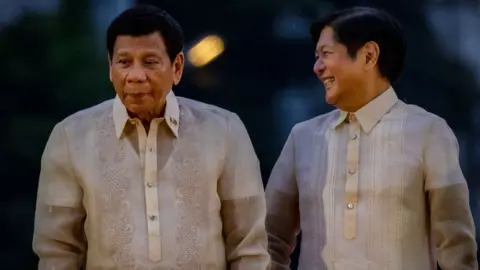IS PRESIDENT MARCOS ULTIMATELY RESPONSIBLE FOR THE ILLEGAL SURRENDER OF FORMER PRESIDENT DUTERTE?
By Atty. Arnedo S. Valera
 |
The unlawful surrender of former Philippine President Rodrigo Duterte to the International Criminal Court, without due process and in blatant violation of the Philippine Constitution and international legal norms, marks the gravest constitutional crisis the Republic has faced in decades.
Recent developments, particularly the decisive action of Ombudsman Samuel Martires ordering an investigation into top officials (though no preventive suspension has been issued), signal that the issue of accountability is now squarely on the table.
Yet this crucial legal and moral reckoning must not stop there.
WHO IS ULTIMATELY RESPONSIBLE?
Is it not, in truth, President Ferdinand "Bongbong" Marcos Jr., as Cabinet Chief and Commander-in-Chief, who bears the supreme responsibility for the illegal arrest and unlawful surrender of his predecessor?
This article argues forcefully that President Marcos cannot evade accountability. He must face the law.
A VIOLATION OF THE CONSTITUTION AND INTERNATIONAL LAW
The illegal and unconstitutional surrender of Duterte did not pass through the legally mandated processes:
- No Philippine court issued a warrant of arrest. Under Philippine law, implementation of an international warrant requires judicial validation.
- No extradition proceedings took place. Under the Constitution and relevant statutes (RA 9851), surrender of a Filipino citizen to a foreign tribunal requires adherence to strict procedures safeguarding sovereignty and individual rights.
- No legislative authorization was sought. Surrendering a former President to a foreign tribunal surrenders national sovereignty, and thus requires Congressional oversight.
- No valid treaty exists. The Philippines withdrew from the Rome Statute effective March 17, 2019.
Without a new treaty or explicit re-acquiescence, any surrender to the ICC is bereft of legal basis.
From the lens of international law, the surrender constitutes male captus, bene detentus — an illegal apprehension violating fundamental due process principles.
OMBUDSMAN MARTIRES’ INVESTIGATION: COMMENDABLE, YET INCOMPLETE
Ombudsman Samuel Martires’ swift directive to investigate key Cabinet officials such as Justice Secretary Jesus Crispin Remulla and Interior Secretary Jonvic Remulla reflects institutional resolve. It conveys a clear message that even the highest officials are not immune from scrutiny.
However, while laudable, the investigation cannot stop with Cabinet officials alone.
Indeed, is it not logical and proper to ask: Who ultimately gave the order? Who sanctioned this surrender that mocked Philippine sovereignty and constitutional processes?
COMMAND RESPONSIBILITY: WHY MARCOS CANNOT ESCAPE ACCOUNTABILITY
Under the 1987 Constitution (Article VII, Sec. 17), President Marcos Jr. is the Chief Executive and Commander-in-Chief.
No Cabinet member could have unilaterally ordered Duterte’s surrender to the ICC. In matters involving national sovereignty and constitutional processes, the President alone sets the policy direction.
Moreover, President Marcos’ public silence and tacit endorsement of the officials involved amount to ratification, if not outright instigation, of this illegal act. His defense of these officials is legally binding evidence of approval.
In international law, leaders bear responsibility for acts of subordinates when they knew or should have known of such acts and failed to prevent or punish them.
THE FILIPINO PEOPLE, AND HISTORY ITSELF, NOW ASK THE INESCAPABLE QUESTION:
Isn’t President Marcos Jr. ultimately responsible for this unlawful surrender?
ACCOUNTABILITY MUST NOT STOP AT THE CABINET LEVEL
Criminal liability and justice must not stop with the Remullas or the police generals who shamefully implemented the arrest.
The ultimate accountability lies with the top decision-maker — the President of the Republic.
President Marcos Jr. must be investigated. The doctrine of command responsibility pierces through indifference, public silence, or willful blindness.
The Ombudsman, and ultimately the Sandiganbayan, must seriously consider the President’s potential culpability. In the spirit of constitutional supremacy and fidelity to the rule of law, even the highest office of the land is not immune.
This is not political vendetta — this is about preserving constitutional order and defending Philippine sovereignty.
THE FINAL VERDICT BELONGS TO HISTORY — AND TO THE FILIPINO PEOPLE
The surrender of former President Duterte was not a mere procedural oversight. It was a constitutional betrayal. By action or inaction, President Marcos Jr. permitted — or directly ordered — this surrender.
Thus, the path of justice must lead all the way to the very top.
The Ombudsman, the Senate, and ultimately history must face this truth. For the rule of law to prevail, President Ferdinand Marcos Jr. must answer to the Filipino people and to the law.
When sovereignty is surrendered unlawfully, it is the duty of the people to demand its restoration — through truth, through justice, and through the unwavering application of the law.
We continue to pray for strength, courage, and safety for Ombudsman Samuel Martires as he faces this defining moment in Philippine history.
About the Author:
Atty. Arnedo S. Valera is the executive director of the Global Migrant Heritage Foundation and managing attorney at Valera & Associates, a US immigration and anti-discrimination law firm for over 32 years.
Comments
Post a Comment